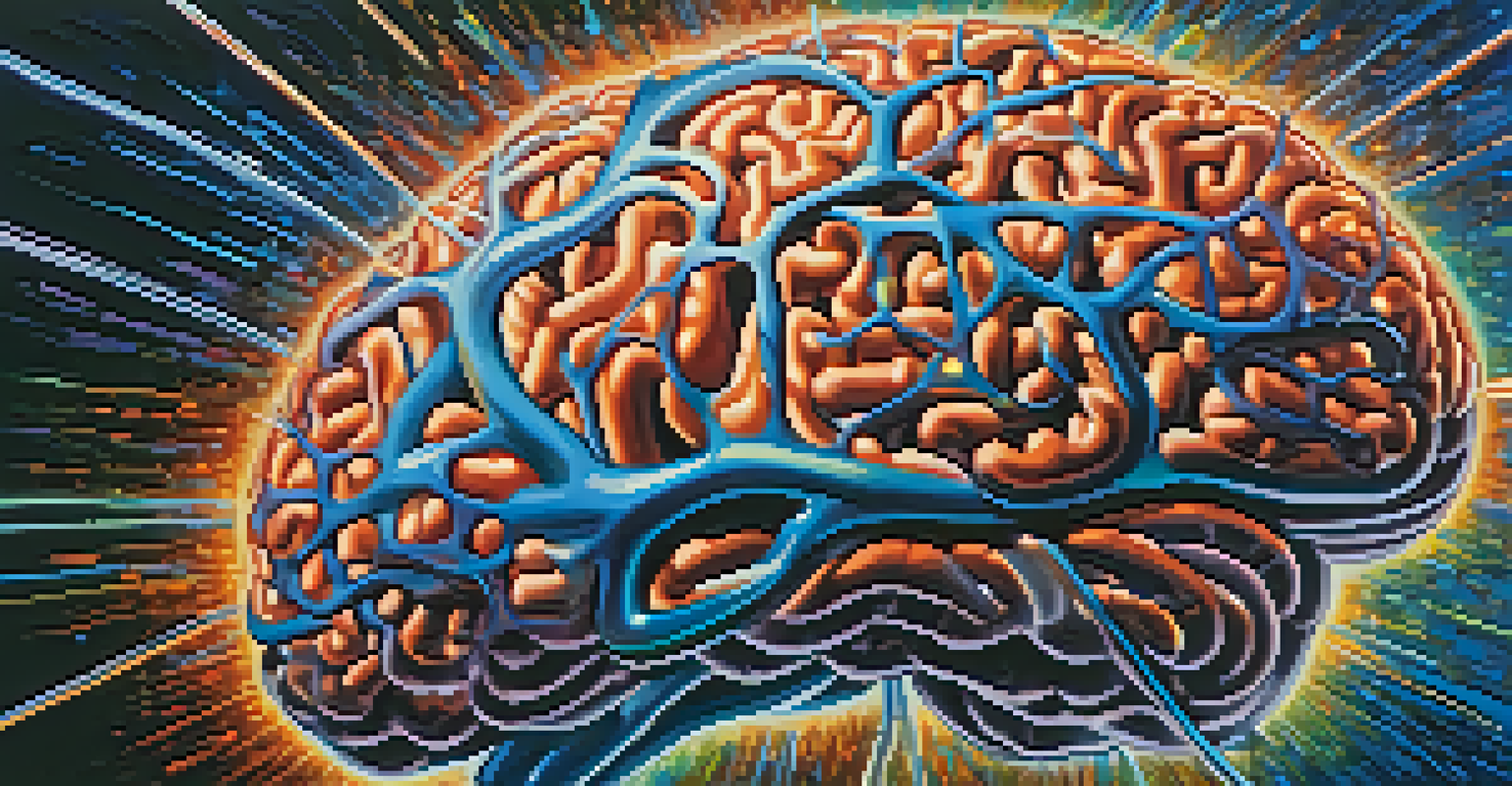The Science Behind Entheogens and Consciousness Expansion

What Are Entheogens and Their Historical Context?
Entheogens are naturally occurring substances that can induce altered states of consciousness, often used in spiritual or religious contexts. Historically, many cultures have harnessed these substances, such as psilocybin mushrooms or ayahuasca, to connect with the divine or explore the depths of the mind. Their use dates back thousands of years, with evidence found in ancient rituals across various civilizations. This rich history sets the stage for understanding how these substances can affect our perception and consciousness today.
Psychedelics can help us understand the workings of the mind, and thereby help us improve our mental health.
In modern times, the resurgence of interest in entheogens has sparked a wave of scientific research aimed at understanding their effects. Studies have shown that these substances can lead to profound experiences of self-discovery, emotional healing, and even a sense of unity with the universe. This growing body of research is shedding light on how entheogens may help unlock new dimensions of human experience, making them a fascinating topic for both scientists and seekers alike.
Despite their powerful effects, it’s important to approach entheogens with respect and caution. Not every experience is positive, and the context in which these substances are used can greatly influence their impact. Understanding their history and cultural significance can provide valuable insights into their potential benefits and risks.
How Entheogens Affect the Brain and Perception
When consumed, entheogens interact with neurotransmitter systems in the brain, particularly serotonin receptors. This interaction can lead to changes in mood, perception, and cognition, allowing individuals to experience life in a new light. For example, many users report vivid visual experiences and a deep sense of interconnectedness during their trips. This alteration of perception can offer new insights into oneself and the world, fostering creativity and introspection.

Research has shown that entheogens can increase brain connectivity, allowing different regions to communicate in ways they normally wouldn't. This can lead to a breakdown of the ego, or the sense of self, resulting in experiences that feel transcendent or spiritual. Such experiences can lead to lasting changes in worldview, enhancing empathy and reducing anxiety for many individuals. It’s like rebooting the mind, offering fresh perspectives on old problems.
Entheogens' Historical Significance
Entheogens have been used for thousands of years in various cultures for spiritual exploration and connection with the divine.
However, the effects of entheogens can vary widely between individuals, influenced by factors such as dosage, environment, and mindset. While some may find enlightenment, others could experience confusion or discomfort. Understanding these variables is crucial for anyone considering exploring entheogens, as setting the right intention can significantly shape the experience.
The Therapeutic Potential of Entheogens
In recent years, entheogens have gained attention for their potential therapeutic benefits, particularly in mental health treatment. Studies involving substances like psilocybin have shown promise in alleviating symptoms of depression, anxiety, and PTSD. These substances can catalyze deep emotional experiences, allowing individuals to confront and process difficult feelings in a supportive environment. This therapeutic approach is often referred to as psychedelic-assisted therapy.
We are all interconnected; we are all part of the same universe, and this experience of oneness is a key to understanding our consciousness.
One of the fascinating aspects of entheogen therapy is the concept of ‘set and setting.’ Set refers to the individual’s mindset, while setting pertains to the physical and social environment. Together, they play a crucial role in determining the outcome of the experience. Creating a safe, supportive environment can significantly enhance the therapeutic effects of entheogens, leading to positive and transformative experiences.
As the stigma surrounding psychedelics begins to fade, more mental health professionals are exploring their potential. While research is still in its early stages, the results so far are promising, suggesting that these substances could become valuable tools in treating various mental health issues. The ongoing studies continue to reveal the profound impact entheogens can have on healing and personal growth.
Entheogens and the Nature of Consciousness
The exploration of entheogens naturally leads to deeper questions about the nature of consciousness itself. What is consciousness? How do altered states induced by entheogens inform our understanding of the mind? Some researchers suggest that these substances can act as a window into alternate states of consciousness, allowing us to explore the boundaries of human perception. This inquiry can provoke thought about the essence of reality and our place within it.
Many users describe experiences that feel profoundly meaningful, often reporting feelings of unity with others or the universe. These experiences challenge the conventional boundaries of the self and can lead to a reevaluation of one’s beliefs and values. Such shifts in perspective can be life-changing, encouraging individuals to embrace a more interconnected view of existence.
Therapeutic Benefits of Entheogens
Recent studies suggest that entheogens may help alleviate mental health issues like depression and PTSD through psychedelic-assisted therapy.
Philosophers and scientists alike are intrigued by the potential implications of these experiences for understanding consciousness. By studying how entheogens alter perception, researchers hope to unlock insights that could lead to a more comprehensive understanding of the mind. This intersection of science and spirituality is rich with possibilities, inviting further exploration into the nature of human experience.
Challenges and Risks Associated with Entheogen Use
While entheogens offer exciting potential for personal and therapeutic growth, they are not without risks. Adverse reactions can occur, especially in individuals with a history of mental health issues. Some users may experience challenging psychological effects, leading to anxiety or paranoia during their journey. Understanding these risks is crucial for anyone considering the use of entheogens, emphasizing the importance of responsible use and guidance.
Moreover, the legal status of many entheogens can pose additional challenges. In many places, these substances are classified as illegal drugs, complicating access for those interested in exploring their benefits. This creates a barrier for research and limits the ability for individuals to participate in guided therapeutic experiences. Advocacy for responsible regulation and education is essential to unlock the full potential of these substances.
Education and preparation are key components in navigating the challenges of entheogen use. Engaging in discussions with knowledgeable professionals and joining supportive communities can help mitigate risks. By fostering a culture of safety and respect, individuals can better prepare themselves for the journey ahead, ensuring a more positive experience.
The Future of Entheogen Research and Exploration
As interest in entheogens continues to grow, so does the body of research investigating their effects and potential benefits. Scientists are increasingly recognizing the value of these substances in understanding consciousness and mental health. Ongoing studies aim to unravel the complex interactions between entheogens and the brain, paving the way for new therapeutic approaches and enhancing our understanding of the mind.
The future of entheogen exploration also includes a heightened focus on responsible use and integration. As more individuals seek out these experiences, integrating insights gained from entheogen use into daily life becomes crucial. This process is often referred to as ‘integration therapy,’ where individuals work to incorporate their experiences into their personal narratives, fostering lasting change and growth.
Risks and Responsible Use
While entheogens offer potential benefits, they also carry risks, especially for individuals with mental health issues, highlighting the need for responsible use and guidance.
Ultimately, the future of entheogens holds the promise of bridging the gap between science and spirituality. By fostering an open dialogue and promoting further research, we can unlock the potential of these substances to enhance our understanding of consciousness and promote healing. As we move forward, the journey into the world of entheogens invites us to explore the depths of our own minds and the mysteries of existence.
Personal Experiences: Stories of Transformation
Many individuals have shared personal stories of transformation through their experiences with entheogens. These narratives often highlight profound insights and emotional breakthroughs that have reshaped their lives. For instance, someone struggling with anxiety might find relief and clarity during a guided psilocybin session, leading to a renewed sense of purpose and connection with others. Such stories illustrate the potential for entheogens to catalyze significant personal change.
These experiences can also foster a sense of community among users. Many people describe feeling a deep connection to others who have shared similar journeys, creating supportive networks that encourage healing and growth. This shared understanding can be incredibly powerful, reminding us that we are not alone in our struggles and that connection is a fundamental aspect of the human experience.

While individual experiences with entheogens can vary widely, the overarching theme often revolves around transformation and healing. By sharing these stories, we can foster a greater understanding of the potential benefits and risks associated with entheogen use, paving the way for more informed discussions. Ultimately, these narratives serve as a testament to the profound impact that exploring consciousness can have on our lives.